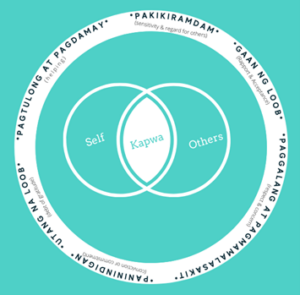Blog
An intergenerational perspective from the Philippines

“We did not realize that our everyday lives are worthy of being studied”
Multi-generational households are a feature of life in the Philippines. Drawing inspiration from Filipino psychology (Sikolohiyang Pilipino), Czarecah Oropilla reflects on intergenerational relations in the Philippines with a particular focus on young children and older adults.
The Philippines is an archipelago of more than 7,107 islands in Southeast Asia. It has a population of around 112 million people spread out in different parts of the world, about 100 million of whom currently live in the country. The Philippines had been colonized several times throughout history making the culture rich, diverse, and unique.
As Filipinos journey on in life, they bring with them a set of values, traditions, and practices of relating with other people anchored in the culture of the motherland. This has been framed within Sikolohiyang Pilipino (SP)a psychology based on the experiences, thought and orientation of Filipinos. A meaningful way of understanding intergenerational learning and practice in the Philippines is through Sikolohiyang Pilipino.
A core element of Sikolohiyang Pilipino is the concept of “kapwa” meaning the “self in others” or the “unity of self and others.” Kapwa entails treating others as you would yourself—as equals. From the core concept of kapwa, an elaborate system of values emerges. These include pakikiramdam (sensitivity and regard for others) and pagtulong at pagdamay (helping and empathising). It becomes clear that valuing intergenerational relationships is at the heart of what it means to be Filipino.

As Filipino families often live in multi-generational households, intergenerational interactions are a daily occurrence. However, as in most countries, these interactions can be short and unintentional especially since children attend learning and care services while parents and grandparents either go to work or stay at home to manage households. The one time that Filipino families stop their individual activities to gather and talk is over food.
Intergenerational conversations and learning happen naturally through food preparation and consumption. The preparation of vegetables is a collaborative process between Lucas and his grandfather Lolo Alex, providing opportunities for participation and communication (photo in the middle). The other two other photos, also show how food is a tool for communication between young children and older adults (between the child Pia and her grandfather and Lucas and her grandmother).

(photos are taken by the families using their mobile phones, used with permission)
Here, kapwa is embodied, enacted, negotiated, and learned. Filipino children first learn the complexities of society through their interactions within family settings. They learn about the social dynamics within and outside their kin, how to communicate and respond appropriately to people depending on their status and age, what to expect from people and institutions, and how to maintain social relations.
The example above is just one example of the many more forms and examples of negotiating kapwa in intergenerational learning and practices in the Philippines that are not usually captured in research or media articles. Indeed, learning from intergenerational interactions at home is so taken for granted that participants in this research said, “We did not realize that our everyday lives are worthy of being studied.”
As a Filipino, I dream of making visible other examples of kapwa.
Czarecah Oropilla (eya.oropilla@hvl.no) is a post-doctoral researcher in IGL in Western Norway University of Applied Sciences, in Bergen, Norway. You can access her complete PhD research (including five articles and book chapters) below.
References:
Oropilla, C. T. (2023). Exploring intergenerational engagements and programmes in the field of early childhood education and care [Doctoral thesis, Western Norway University of Applied Sciences]. HVL Open. https://hdl.handle.net/11250/3061964
Oropilla, C.T., Guadaña, J.C., Santiago-Saamong, C.R. (2023). Sikolohiyang Pilipino: Implications for Formal and Informal Learning Institutions and Settings in the Philippines. In: Hebert, D.G. (eds) Comparative and Decolonial Studies in Philosophy of Education. Springer, Singapore. https://doi.org/10.1007/978-981-99-0139-5_5